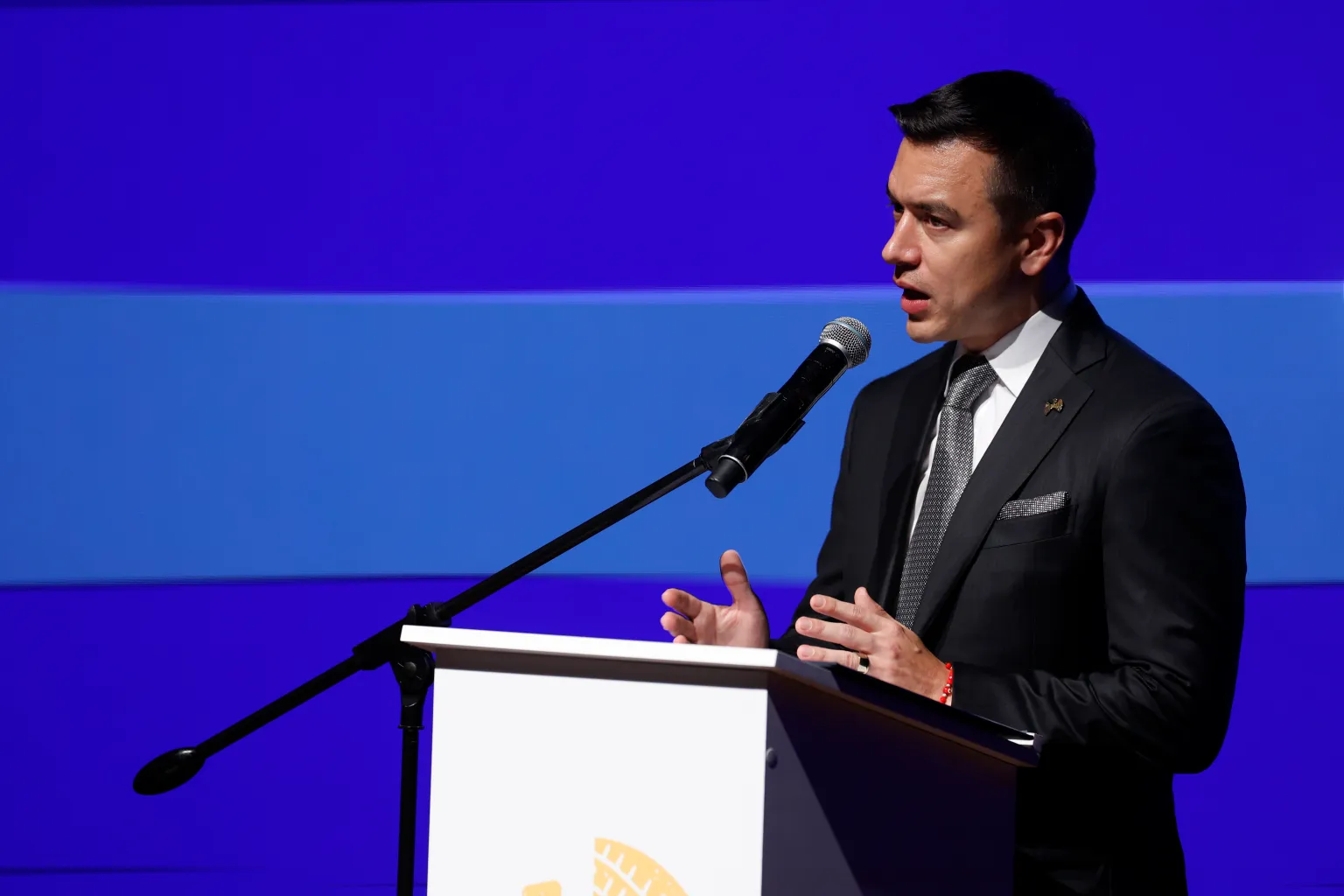International
The Ibero-American Summit begins, the first without Latino presidents except the host

The XXIX Ibero-American Summit started this Friday in Cuenca (Ecuador) with the attendance of the lowest leaders in the history of this forum, which began in 1991, and without any president of Latin America, with the exception of the host, Daniel Noboa, an unprecedented fact in this series of meetings between the twenty-two countries of Ibero-America.
This event, whose motto is ‘Innovation, inclusion and sustainability’, only the King of Spain, Felipe VI; the president of Portugal, Marcelo Rebelo de Sousa, and the head of the Government of Andorra, Xavier Espot, arrived, while, in another unprecedented event, the chairs of three countries were empty: Mexico, Nicaragua and Venezuela, which maintain broken relations with Ecuador.
Ibero-American Summit in the midst of tensions
Despite the scarce presence of leaders, the delegations are working to adopt a declaration that includes the agreements reached during the preparatory meetings, especially in terms of cooperation, but the talks are encountering obstacles in countries opposed to gender policies and focused on the sustainable development objectives (SDGs), according to sources close to the negotiation.
Tensions also focused on Cuba’s disagreement with Argentina’s claim to remove from the declaration a condemnation of the United States blockade of the Caribbean country, according to other sources also consulted by EFE during the development of the meeting of foreign ministers.
Given the difficulty of achieving the unanimity necessary to issue a statement from this Summit, countries such as Spain, Costa Rica, Panama and Chile promoted a declaration supported by the vast majority of participants, which will not be an official document of the appointment.
Allamand asks for cohesion
“It would be absurd to ignore that the region is experiencing convulsive times,” admitted the Ibero-American Secretary General, Chilean Andrés Allamand, in his speech at the opening ceremony of the Ibero-American Summit.
The head of the Ibero-American General Secretariat (Segib) remarked that “the world needs more and not less multilateralism, cooperation and solidarity,” in a context where “politics is besieged by fragmentation and polarization.”
“The consequence of this is the great difficulty in generating consensus, which slows down the reforms that could lay new foundations of prosperity and coexistence,” said Allamand.
In that sense, he recalled that “the Ibero-American meeting allows us to distinguish us in a world in which conflicts explode, threats loom, injustices are perpetuated.”
“The Ibero-American meeting is the one that allows, in times of difference, to reach consensus, in times of fragmentation, to provide unity, in times of division and to promote cohesion,” while, “in times of difference, to take steps to argumentation, but not to exclusion.”
Thus, Allamand invited to “claim Ibero-America” and take advantage of “a work of more than 30 years in which the search for consensus has prevailed and in which advances have been generated with a real impact on people’s lives.” “This is not the time for resignation, but for ambition,” he added.
Noboa: “We carried out the Summit despite the conflicts”
For his part, Noboa said that his administration has worked to carry out this Summit, “despite all the internal and external problems and conflicts.”
The president, the youngest in Latin America, 36 years old, called for innovative solutions against transnational organized crime, climate change, the labor inclusion of young people, environmental protection, access to education and the strengthening of connectivity.
That is why he encouragered support for young people through job creation and vocational training, which in his opinion will open paths towards equitable economic growth.
“This will only be possible to achieve with the commitment of the business sector, as evidenced at the XV Ibero-American Business Meeting, which concluded this afternoon with the approval of the ‘Commitment to employability’,” Noboa celebrated at the Ibero-American Summit.
“The alarming unemployment rates make us an easy target for organized crime, which undermines the economic and social development of our nations. We must promote policies that encourage public-private investments and allocate resources to education to forge a better future for youth,” he concluded.
After the inauguration of the XXIX Ibero-American Summit, the forum will continue this Friday with the development of the plenary sessions, in which the Heads of State and Government will intervene, as well as the delegates of the other representations.
International
Dominican ‘False Hero’ Arrested for Faking Role in Nightclub Collapse That Killed 231

A man identified as Rafael Rosario Mota falsely claimed to have rescued 12 people from the collapse of the Jet Set nightclub in Santo Domingo—a tragedy that left 231 people dead—but he was never at the scene.
Intelligence agents in the Dominican Republic arrested the 32-year-old man for pretending to be a hero who saved lives during the catastrophic incident, authorities announced.
Rosario Mota had been charging for media interviews in which he falsely claimed to have pulled survivors from the rubble after the nightclub’s roof collapsed in the early hours of April 8, during a concert by merengue singer Rubby Pérez, who was among those killed.
“He was never at the scene of the tragedy,” the police stated. The arrest took place just after he finished another interview on a digital platform, where he repeated his fabricated story in exchange for money as part of a “media tour” filled with manipulated information and invented testimonies.
“False hero!” read a message shared on the police force’s Instagram account alongside a short video of the suspect, in which he apologized: “I did it because I was paid. I ask forgiveness from the public and the authorities.”
Central America
Nicaraguan Exiles to Mark 7th Anniversary of 2018 Protests with Global Commemorations

The Nicaraguan opposition in exile announced on Thursday that it will commemorate the seventh anniversary of the April 2018 protests against the government of President Daniel Ortega and his wife, Rosario Murillo, with events in Costa Rica, the United States, and several European countries.
The commemorative activities—which will call for justice for the victims, as well as freedom and democracy for Nicaragua—will include religious services, public forums, cultural fairs, and other public gatherings, according to official announcements.
In April 2018, thousands of Nicaraguans took to the streets to protest controversial reforms to the social security system. The government’s violent response quickly turned the demonstrations into a broader call for the resignation of President Ortega, who is now 79 and has been in power since 2007.
The protests resulted in at least 355 deaths, according to the Inter-American Commission on Human Rights (IACHR), although Nicaraguan organizations claim the toll is as high as 684. Ortega has acknowledged “more than 300” deaths and maintains the unrest was an attempted coup d’état.
International
Arsenal stun Real Madrid at the Bernabéu to reach Champions League semifinals

Arsenal enjoyed a “historic night” on Wednesday after defeating Real Madrid 2-1 at the Santiago Bernabéu, knocking them out of the Champions League quarterfinals, midfielder Declan Rice said.
“It’s such a special night for this club, a historic night for this club,” said Rice, who scored twice in the first leg in London, speaking to TNT Sports.
The English international was named Man of the Match in both legs — the 3-0 win in London and the second leg in Madrid.
“It’s amazing. I knew we were on an upward trajectory and we’ve done incredibly well in this competition. We deserve it and we have full confidence in our coach. Reaching the semifinals is unbelievable,” Rice added.
-

 International5 days ago
International5 days agoNightclub Collapse in Dominican Republic Claims 226 Lives
-

 International5 days ago
International5 days agoVenezuela accuses Guyana of “warlike intentions” after UK defense deal
-

 Central America3 days ago
Central America3 days agoHonduran Police Offer $135K for Tips Leading to the Arrest of Romeo Vásquez
-

 Central America3 days ago
Central America3 days agoPetro questions Ecuador’s vote, cites reports of military control and arrests
-

 International3 days ago
International3 days agoMPV Denounces Electoral Blockade as Secretary-General is Disqualified for May Elections
-

 International2 days ago
International2 days agoArsenal stun Real Madrid at the Bernabéu to reach Champions League semifinals
-

 International3 days ago
International3 days agoMaduro Plans Major Workers’ March on May 1st to Defend Venezuela’s Freedom
-

 International2 days ago
International2 days agoBogotá residents line up for yellow fever vaccine amid national alert
-

 International2 days ago
International2 days agoMexico refuses to restore ties with Ecuador while Noboa remains in office
-

 International2 days ago
International2 days agoDeSantis’ immigration crackdown sparks alarm in Venezuelan Communities in Doral
-

 International3 days ago
International3 days agoColombia: Search continues for missing limb of italian scientist found dismembered
-

 International14 hours ago
International14 hours agoDominican ‘False Hero’ Arrested for Faking Role in Nightclub Collapse That Killed 231
-

 Central America14 hours ago
Central America14 hours agoNicaraguan Exiles to Mark 7th Anniversary of 2018 Protests with Global Commemorations















